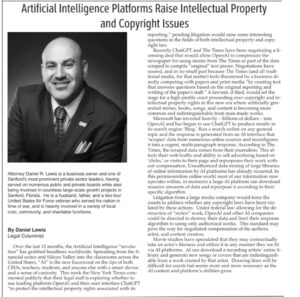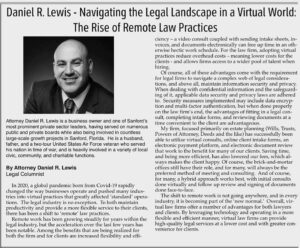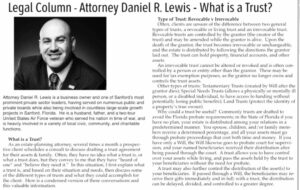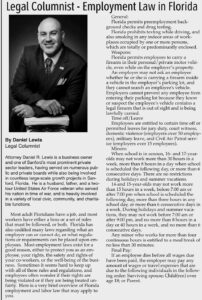In his latest article in the Sanford Herald dated September 9, 2023, Attorney Lewis discusses pending litigation regarding artificial intelligence platforms.
Artificial Intelligence Platforms Raise Intellectual Property and Copyright Issues
Over the last 12 months, the Artificial Intelligence “revolution” has grabbed headlines worldwide. Spreading from the financial sector and Silicon Valley into the classrooms across the United States, “AI” is the new buzzword on the lips of both CEOs, teachers, students, and anyone else with a smart device and a sense of curiosity. This week the New York Times commented publicly that their legal staff is exploring whether to sue leading platform OpenAI and their user interface ChatGPT “to protect the intellectual property rights associated with its reporting.” pending litigation would raise some interesting questions in the fields of both intellectual property and copyright law.
Recently ChatGPT and The Times have been negotiating a licensing deal that would allow OpenAI to compensate the newspaper for using stories from The Times as part of the data scraped to compile “original” text pieces. Negotiations have soured, and in no small part because The Times (and all traditional media, for that matter) feels threatened by a business directly competing with papers and print media “by creating text that answers questions based on the original reporting and writing of the paper’s staff.” A lawsuit, if filed, would set the stage for a high-profile court proceeding over copyright and intellectual property rights in this new era where artificially generated stories, books, songs, and content is becoming more common and indistinguishable from man-made works.
Microsoft has invested heavily – billions of dollars – into OpenAI and has begun to use ChatGPT to produce results in its search engine ‘Bing.’ Run a search online on any general topic, and the response is generated from an AI interface that ‘scrapes’ data from numerous online sources and reconfigures it into a cogent, multi-paragraph response. According to The Times, the scraped data comes from their journalists. This affects their web-traffic and ability sell advertising based on ‘clicks,’ or visits to their page, and repurposes their work without compensation. Unauthorized data mining of large libraries of online information by AI platforms has already occurred. In this permissionless online world most of our information now operates within, in moments a large AI platform can download massive amounts of data and repurpose it according to their specific algorithm.
Litigation from a large media company would force the courts to address whether any copyright laws have been violated by these actions. Under federal law allowing for the destruction of “stolen” work, OpenAI and other AI companies could be directed to destroy their data and limit their response algorithm to using only authorized works. This standard may pave the way for negotiated compensation of the authors, artist, and content creators.
Movie studios have speculated that they may contractually take an actor’s likeness and utilize it in any manner they see fit via AI platforms. AI can download a recording artists’ entire library and generate new songs or covers that are indistinguishable from a work created by that artist. Drawing lines will be difficult for courts but seems more and more necessary as the AI content and platform’s abilities grow.






